
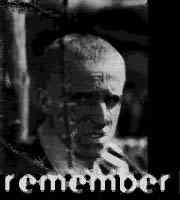




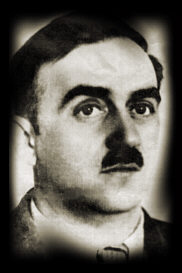
During the years of the Nazi occupation of Lithuania a German Sergeant Anton Schmid disobeyed his superior officers and saved 250 Jewish men, women, and children from extermination in Nazi death camps by hiding them, supplying them with false ID papers and helping them escape. On 13. April 1942, he was executed by the Nazis ...
We would never have known the story of Sergeant Anton Schmid, had it not been for those who owe him their lives. And most recently, Germany renamed a military base Feldwebel Anton Schmid Kaserne in his honor for his courage.
Anton Schmid was an electrician who owned a small radio shop in Vienna. Drafted into the German army after the Anschluss of 1938, Schmid found himself stationed near Vilnius in the autumn of 1941. The Germans had entered Lithuania shortly before. As a sergeant of the Wehrmacht he witnessed the herding of Jews into two ghettos and the shooting of thousands of them in nearby Ponary. In a letter to his wife, Stefi, Schmid described his horror at the sight of mass murder and of "children being beaten on the way". He went on: "You know how it is with my soft heart. I could not think and had to help them."
During much of the 19th century and continuing in the 20th century until the Nazi invasion, Vilnius and Warsaw were Europe's two preeminent centers of Jewish cultural, intellectual, religious and political life. In the summer of 1941, the Nazis launched a genocidal campaign of mass murder and deportations to death camps that, in three years, systematically killed about 180,000 Jews, i.e. about 94% of the Jews living in Lithuania before World War II, the largest percentage of any country. Today there are 6,000 Jews left in Lithuania ..
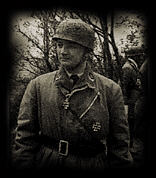
Karl Jager
On December 1, 1941, SS-Standartenfuhrer Karl Jager reported that the Nazis had annihilated some 137,000 men, women and children, predominantly Jews. The rest, he reported, had been effectively ghettoized:
By the SS Einsatzgruppen - "Action Groups"
From a Secret Reich Letter
The Commander of the
Security Police and the SD Einsatzkommando 3
Kauen [Kaunas, Kovno]
1 December 1941
Today I can confirm that our objective, to solve the Jewish problem for Lithuania, has been achieved by EK 3. In Lithuania there are no more Jews, apart from Jewish workers and their families. The distance between from the assembly point to the graves was on average 4 to 5 Km.
I consider the Jewish action more or less terminated as far as Einsatzkommando 3 is concerned. Those working Jews and Jewesses still available are needed urgently and I can envisage that after the winter this workforce will be required even more urgently. I am of the view that the sterilization programme of the male worker Jews should be started immediately so that reproduction is prevented. If despite sterlization a Jewess becomes pregnant she will be liquidated.
signed:
Jager
SS-Standartenfuhrer
Anton Schmid was moved by the suffering of the Jews in the Vilnius ghetto and decided to help. He managed to release Jews from jail and risked his own life by smuggling food into the ghetto. His courageous assistance involved the saving of more than 250 Jews whom he managed to hide and the supplying of materiel and forged papers to the Jewish underground.
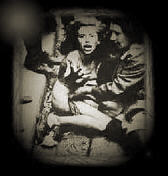
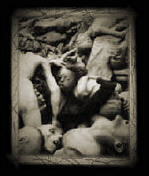
Arrested in January 1942, and summarily tried before a Nazi military court on February 25, Anton Schmid was executed on April 13 by the Nazis for his acts.
If Sergeant Schmid's acts were enormously rare, he evidently saw nothing extraordinary in them. "I merely behaved as a human being," he said in his last letter to his wife. In all the hell that was breaking loose around him, he chose to stay awake, to keep his head up and his heart opened. In the midst of so much death and destruction, he found some way to value life and brought back life and restoration in the only way he knew to do. He stood out as one of the few known German soldiers who had enough courage to do what he felt was right.
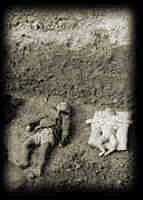

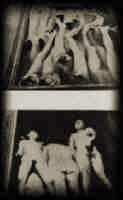
Auschwitz Bergen-Belsen Belzec Sobibor Treblinka
In her book, "Eichmann in Jerusalem: A Report on the Banality of Evil," Hannah Arendt singled out the example of Sergeant Schmid as illustrating the lesson that "under conditions of terror, most people will comply but some people will not." She continued, "How utterly different everything would have been in Israel, in Germany, in all of Europe, and perhaps in all countries of the world, if only more such stories could have been told."
On 16 May 1967, the Israeli government paid tribute to Sergeant Anton Schmid. Yad Vashem awarded his widow the medal 'Righteous Among the Nations' which bears the inscription: "Whoever saves one life - saves the world entire."
In Germany the honoring of army sergeant Anton Schmid on May 8, 2000, appeared particularly significant because his name replaced that of an army general, Günther Rudel, who fought in two world wars and had been held up as a hero and example in the first decades after World War II.
Many Germans have long clung to the notion that Nazi atrocities were not the work of the army but of Hitler's elite SS and fanatical death squads. Now the government decided to strip a Wehrmacht general's name from a base and, for the first time, identify a military institution with a soldier who saved Jews. As Rudolf Scharping, the defense minister, said:
"We are not free to choose our
history, but we can choose the examples
we take from that history. Too many bowed to the threats and temptations of the
dictator, and too few found the strength to resist. But Sgt. Anton Schmid did
resist ..."
sources:
The New York Times
Simon
Wiesenthal Multimedia Learning Center
www.auschwitz.dk
www.oskarschindler.com
www.shoah.dk
© 2007-2009 Louis Bülow. All Rights Reserved.